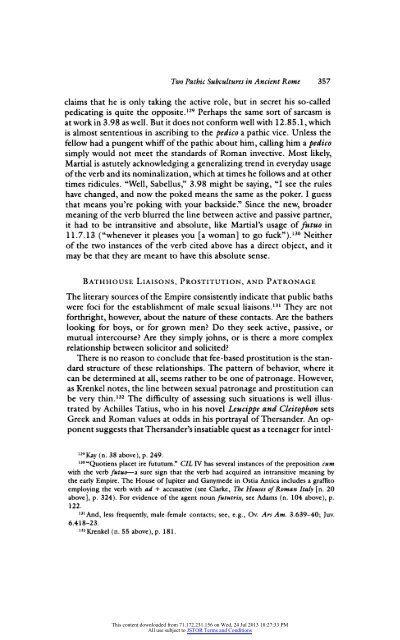Two Pathic Subcultures in Ancient Rome
Two Pathic Subcultures in Ancient Rome
Two Pathic Subcultures in Ancient Rome
You also want an ePaper? Increase the reach of your titles
YUMPU automatically turns print PDFs into web optimized ePapers that Google loves.
<strong>Two</strong> <strong>Pathic</strong> <strong>Subcultures</strong> <strong>in</strong> <strong>Ancient</strong> <strong>Rome</strong> 357<br />
claims that he is only tak<strong>in</strong>g the active role, but <strong>in</strong> secret his so-called<br />
pedicat<strong>in</strong>g is quite the opposite.'29 Perhaps the same sort of sarcasm is<br />
at work <strong>in</strong> 3.98 as well. But it does not conform well with 12.85. .1, which<br />
is almost sententious <strong>in</strong> ascrib<strong>in</strong>g to the pedico a pathic vice. Unless the<br />
fellow had a pungent whiff of the pathic about him, call<strong>in</strong>g him a pedico<br />
simply would not meet the standards of Roman <strong>in</strong>vective. Most likely,<br />
Martial is astutely acknowledg<strong>in</strong>g a generaliz<strong>in</strong>g trend <strong>in</strong> everyday usage<br />
of the verb and its nom<strong>in</strong>alization, which at times he follows and at other<br />
times ridicules. "Well, Sabellus," 3.98 might be say<strong>in</strong>g, "I see the rules<br />
have changed, and now the poked means the same as the poker. I guess<br />
that means you're pok<strong>in</strong>g with your backside:' S<strong>in</strong>ce the new, broader<br />
mean<strong>in</strong>g of the verb blurred the l<strong>in</strong>e between active and passive partner,<br />
it had to be <strong>in</strong>transitive and absolute, like Martial's usage of futuo <strong>in</strong><br />
11.7.13 ("whenever it pleases you [a woman] to go fuck").130 Neither<br />
of the two <strong>in</strong>stances of the verb cited above has a direct object, and it<br />
may be that they are meant to have this absolute sense.<br />
BATHHOUSE LIAISONS, PROSTITUTION, AND PATRONAGE<br />
The literary sources of the Empire consistently <strong>in</strong>dicate that public baths<br />
were foci for the establishment of male sexual liaisons.'3' They are not<br />
forthright, however, about the nature of these contacts. Are the bathers<br />
look<strong>in</strong>g for boys, or for grown men? Do they seek active, passive, or<br />
mutual <strong>in</strong>tercourse? Are they simply johns, or is there a more complex<br />
relationship between solicitor and solicited?<br />
There is no reason to conclude that fee-based prostitution is the standard<br />
structure of these relationships. The pattern of behavior, where it<br />
can be determ<strong>in</strong>ed at all, seems rather to be one of patronage. However,<br />
as Krenkel notes, the l<strong>in</strong>e between sexual patronage and prostitution can<br />
be very th<strong>in</strong>.'32 The difficulty of assess<strong>in</strong>g such situations is well illustrated<br />
by Achilles Tatius, who <strong>in</strong> his novel Leucippe and Cleitophon sets<br />
Greek and Roman values at odds <strong>in</strong> his portrayal of Thersander. An opponent<br />
suggests that Thersander's <strong>in</strong>satiable quest as a teenager for <strong>in</strong>tel-<br />
I" Kay (n. 38 above), p. 249.<br />
130"Quotiens placet ire fututum." CIL IV has several <strong>in</strong>stances of the preposition cum<br />
with the verb futuo-a sure sign that the verb had acquired an <strong>in</strong>transitive mean<strong>in</strong>g by<br />
the early Empire. The House of Jupiter and Ganymede <strong>in</strong> Ostia Antica <strong>in</strong>cludes a graffito<br />
employ<strong>in</strong>g the verb with ad + accusative (see Clarke, The Houses of Roman Italy [n. 20<br />
above], p. 324). For evidence of the agent noun fututrix, see Adams (n. 104 above), p.<br />
122.<br />
'31And, less frequently, male-female contacts; see, e.g., Ov. Ars Am. 3.639-40; Juv.<br />
6.418-23.<br />
'32Krenkel(n. 55 above), p. 181.<br />
This content downloaded from 71.172.231.156 on Wed, 24 Jul 2013 18:27:33 PM<br />
All use subject to JSTOR Terms and Conditions
















